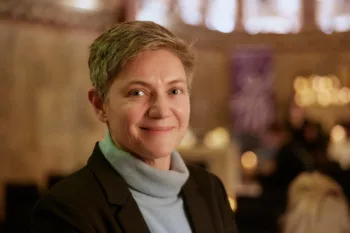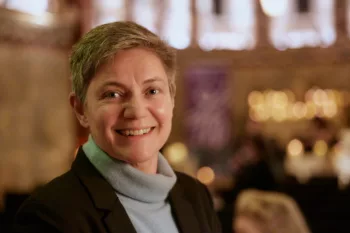Our Celebrant Network: Meet Blue Ryan – Funeral Celebrant
Blue Ryan is a documentary filmmaker and a humanist funeral celebrant, who believes in the power of telling stories. She tells us about what her two roles have in common, the values that attracted her to humanism, and the moving experience of leading the Trans Day of Remembrance ceremony for LGBT Humanists.
“I was attracted by the idea that everyone is equal, everyone has inherent dignity and we all create our own meaning,” explains Blue. These humanist values aligned with her own. “I don’t believe in God or an afterlife. I believe we can live moral, happy, healthy lives for ourselves and to encourage others.
“I had a Christian upbringing – my father was a vicar. As a young person, I felt that some parts of my life had to be deferred until I left home. That’s when I told my parents that I didn’t have a faith and I came out as a lesbian. My family were very loving, but I had to forge my own life.
“Taking funerals as a celebrant makes me feel close to my parents, especially my dad. I can see the ways that I am like him. I’ve had the surviving partner of a same-sex couple or a non-binary person come to me, sometimes via a funeral director. It may be because they are looking for an LGBTQ+ celebrant. Things are hard enough when you are grieving, for some people finding a celebrant from the LGBTQ+ community means one less thing to explain or worry about.”

‘When you take someone’s funeral, you tell their life story.’
Blue trained to be a celebrant during lockdown, after taking voluntary redundancy from the BBC. She describes the training from Humanist Ceremonies as rigorous, professional and well-organised. She now conducts funeral ceremonies alongside running her own production company. She has found that the two roles have a lot in common.
“Both are about stories. Stories are how we learn and pass on wisdom from generation to generation. They are how we make sense of things. When you take someone’s funeral, you are responsible for telling their life story. It’s very deep and intense – different to making a film where you can spend months getting to know people. I make observational documentaries, working with people in vulnerable situations. It’s all about listening to people who are going through loss and trauma.
“It’s about accepting that everyone had a unique experience of the person who has died, and there may be contradictions. I have to honour these. In general, I find if someone wants a humanist funeral, they tend to want something that gives a well-rounded view of the person.”
‘Hearing people’s stories is fascinating’
To gain that well-rounded view of a person’s life, a humanist celebrant always meets with family and friends to hear their stories. This could be in-person, on the phone or online. Blue explains why this is so crucial.
“Family meetings are so important,” she says. “Hearing people’s stories is fascinating for me and being listened to is valuable for them. I like to meet them in the setting where they, or the person, lived. They often talk at great length, far longer than the actual ceremony will last.
“Next, I start a draft of the ceremony which I share with them. It’s very collaborative. I will do research if I need more details about something that happened in the distant past, for example knowing the location where someone grew up means I can research what it was like being there at that time.”
Remembering trans lives lost to intolerance
Vigils and ceremonies are held around the world for Trans Day of Remembrance on 20 November every year. The names of trans people who have lost their lives due to violence are read out loud. In 2022 and 2023, Blue led a ceremony on behalf of Humanists UK. It obviously had a deep impact on her.
“The Trans Lives Matter website gives the name, age, location, cause of death and other information for each person. Some are so young, in their teens or early twenties. Predominantly black trans women. These are people who had so much to offer – they were loving and were loved. They lost their lives simply because of intolerance. We remembered them.
“It took over 25 minutes to read all the names out, with silence after each country’s names were read. The London Humanist choir performed. It was very powerful and moving.
“We asked everyone to write down what the Trans Day of Remembrance meant to them. There was such anger there, such a sense of loss, of wanting to do better and to be good allies. I thought it was wonderful. I am proud that humanists are stepping up as trans allies.”
While this ceremony is very different from the funeral ceremonies that Blue delivers for individuals, it was underpinned by the same values.
“As a society, it’s important that we mark events by coming together,” Blue explains. “There is a connectedness which is important for the people who are left behind. This can be really healing and that’s moving to see.”

Contacting Blue
You can find out more about Blue and her ceremonies here.
Find a humanist celebrant near you
If you’re planning a funeral for yourself or a loved one, you can find your local celebrant via our celebrant map.
LGBT Humanists
Our Trans Day of Remembrance ceremony was held by LGBT Humanists, a volunteer-led section of Humanists UK who campaign for equality and diversity, particularly relating to sexual orientation and identity. Find out more about LGBT Humanists.





